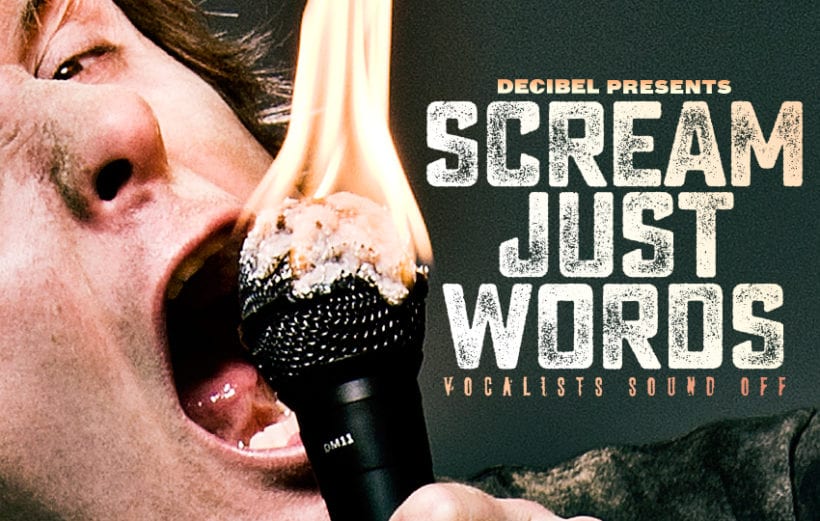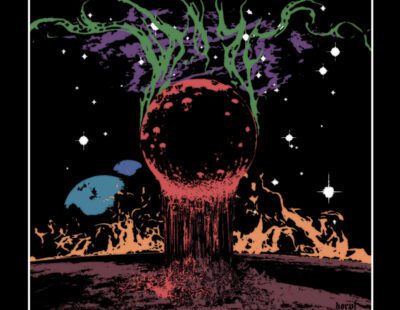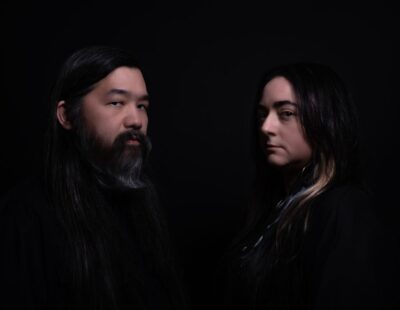
by Rob Fusco
Since boyhood I have remained transfixed at the alchemy of the vocalist-lyricist. The ones who devote themselves to the discipline honestly seem to display an almost mystical power to transmute words into emotion through deft and clever arrangement, pacing, tone, alliteration, selecting between dozens of arcane tools at their disposal to help them render their vision, to hit the heart with what goes in the ears.
This fascination persisted into adulthood, and fortunately there are a few legendary and brilliant vocalists who were willing to peel back the veil and give me, and you, a glimpse at what goes on in the laboratory of their mind when set to the task of layering themselves and their chosen themes onto the instrumental work, as well as the depth of their relationship with language and expression.
Here’s what these sage veterans had to say about their process when the time comes to write and arrange for their listeners:
Kristin Hayter, Lingua Ignota
“Language and voice have always been super important to me, as well as in music they sit at the basis of my academic work. My approach to lyric writing is, mostly, to radically recontextualize pre-existing content. Some people already know that the origin of the writing at the beginning of the Lingua Ignota project is basically technologically-mediated pornogrind lyrics mixed with media from my own experiences of abuse and violence. The algorithmically-generated result is an uncomfortable voice, a wrathful and bilious entity which is somehow not really a speaker at all, and it’s up to me to then deliver it with conviction and authenticity, to make the voice mine. I take from sources as diverse as The New Testament, the final interview of Aileen Wuornos, prayers from death cults, internet shit-posting, etc. Some of this is indebted to the original concept behind my project: Expressing the inexpressible (trauma) by eschewing a genre or a home. I also look to conceptual writers such as Urs Allemann, Samuel Beckett or Kenneth Goldsmith, the latter saying that our daily over-saturation with written information has made language meaningless, and so exploding ownership of language and taking a deconstructed approach to composition may be the only way to make something new or unheard of.”
Blake Foard, Crow Killer
“My process really begins when the guys in Crow Killer are finishing up putting the song together, setting the tone musically for what train wreck comes next being the lyrics and vocals. I let the music resonate within my emotional scope and I try to reflect upon the world around me and my past experiences. The world has been kind enough to bless us with a shitstorm of inspiration as of late. A part of me wants to be understood, relatable. Another part of me wants to remain a mystery. A ghost.
As time goes on, I feel that my words become more and more meaningless to most people who hear Crow Killer. I can’t say that I blame anyone for ignoring what I write. The world is flooded with information and entertainment that human beings are overstimulated and the attention spans are cut short. All that matters to me is the finished product, a song that makes me feel something. Anything. If we resonate with someone then I will call that a success.”
Randy Blythe, Lamb of God
“Sometimes I write lyrics before I hear any music from my band, other times I write to demos they give me—there is no hard and fast rule. Oddly enough, many times words and phrases come to me while I’m driving in my truck to go surfing; I think something about the forward motion of the vehicle combined with the anticipation of doing something I love summons the muse. If I write lyrics before hearing music, there is almost always a pretty heavy editing phase in order to make the words flow syllabically within the structure of the song. While I get an immense sense of satisfaction out of writing good lyrics, there is a dark side to it: Within the context of Lamb of God, I don’t write about happy/pleasurable topics. By the time I am done writing for an entire album, I have been dwelling in a pretty negative headspace for quite some time and my emotional well-being suffers as a result. When I write for different projects, such as my other group, Saudade, it’s not so bad—there’s room for lightness and joy. But Lamb of God does not write light, feel-good, “happy” music, and the lyrics reflect that tonal gravity. I’m always stoked when the lyric writing process is done, and even more so when the recording bit is over.”
Mark “Barney” Greenway, Napalm Death
“Being very forward-looking and fluid in its musical approach, Napalm Death is a treasure trove of entry points for me. I will listen to an instrumental version of a song many times before I start to hum unformed lines to myself. And let’s get this straight: Contrary to some opinions, there are multiple ways to approach the placement of vocal lines. It’s quite easy to default to just placing 3 or 4 words in 3 or 4 equally-spaced lines, and sometimes this can work well above all else. But there have definitely been many times where perhaps starting vocals a little later in a bar or singing against the cadence of a riff have produced, to my mind, more spectacular results.
If I end up singing the trusty ND full-throat style, you can bet that I’ve pondered all other styles equally—if potentially beneficial to the track. My only guiding principle, I think, is that whatever I do doesn’t lessen the overall abrasiveness so pivotal to Napalm Death. Is that conducive to being more genuine? I think that’s an impossible thing to establish yourself and is always going to matter for the listener’s subjectivity.
Lyrically, well, I am an unashamed language nerd. I love the art of expression in that respect, but I also understand at the same time that seeming like you’re just regurgitating a dictionary ad nauseum just seems a bit lacking in vision. There’s a definitely a balance to be struck—using things like irony, metaphor, pathos and—tricky as things go, but certainly doable—humour. If I can ever get to the level of the likes of Jello Biafra or Steve Ignorant, I feel I will have arrived. Ha ha.”
Eugene S. Robinson, Oxbow
“It’s sometimes months, even years in OXBOW time, before I sing what I’ve written. So what I write tends to trade on that which I can’t speak about directly, usually, but which I feel a need to document. Wire magazine figured this out and pegged the stylistic turn to some ‘unspecified disaster.’ Which it was and has been.
So the words frame this as a conversation using, typically, fictional characters for the very real ones that populate my life. From Fuckfest to Thin Black Duke is one book of this, really. Love’s Holiday, our unreleased newest, is the first done outside of this cycle and method. It’s a deep dive on where you live when you’ve emerged from the vale of those unspecified disasters and as such the lyrics are closer, more intimate, heavier and me just doing the best I can with the head I have in processing the fact that I’m not dead yet.
I will listen to the music for weeks, months maybe, before I let the lyrics take shape. I go to practice all the time but never sing a word. Just listen. After a certain point the music starts to let me know what it wants. It’s my job to frame this as word/thought structures. Like I said, everything from our first record to our last one was themed… which means I had a pre-structured plan for it. Like if we were making a fourth installment in a movie there are lots of questions that don’t need to be answered.
Love’s Holiday, however? All I knew is that I wanted to address the constructive and destructive monster of love in a way that I had not ever heard before. Not as longing. But partially as crippling desire and then paranoic ideation. Beyond my personal pathologies and into a place where everything was really… you know: OK.
But because we had so many songs on this record—17 or 18 I believe—only some adhere to this. Others were pure music magic.
But a song like ‘1000 Hours in a Day,’ without deconstructing it too much, is about a mania for a very certain and specific type of love. One that undoes you while it does you. It’s clear here we could be talking about drugs. Or danger. Or an addiction to all three. However the words describe a STATE of being in a not very direct way.
Here’s an example. I’m listening to music as I write this. I hear my wife in the next room talking to my infant daughter. There’s music playing that sounds like The Byrds. And water running outside. My job is to get you THERE.
So… maybe I’d do this…
An afternoon yellowed by smoke in front of the sun
and my night terrors have stuck with me in the day
that one day some way this will all go away
no matter how fast and hard I run
Were that to be made into a song, years from now I would know what I meant and where I was. But it’s not so insider-y that you wouldn’t also be able to identify at least the sensation. Yeah?”
Ethan McCarthy, Primitive Man/Vermin Womb/Many Blessings
“90% of the time I write lyrics independently without any set song in mind. So the music will be written for whatever project I am focusing on and then I might sing 1-3 different sets of lyrics during rehearsals or even in the studio if the time constraint is [as] insane as it has been in the past. I have only written 2 songs in Primitive Man’s catalog while we were rehearsing the music for them and that was while we were on tour overseas testing these songs out on live audiences and I was kind of ‘feeling’ what I wanted to say. A lot of the process for me is about ‘feeling’ whether or not the words I’m saying match the vibe of the tones we are creating. So even if I test out 1, 2 or 3 different sets of lyrics when we are putting this stuff together, I know when it clicks with the right set.”
Mike DC, Damnation AD/When Tigers Fight
“I have never been able to write for a song. Writing for me has always been about clearing my head. It comes out in fits and starts. It is out of desperation. When I am at my worst I cannot even think of putting anything down. It is only after I have distanced myself from an episode a bit that I can begin to try to express myself. I need that space to process it then move on.”
Vincent Bennett, The Acacia Strain
“It’s a process that normally takes me from album to album. I never sit down and just ‘write.’ I write lines or words or paragraphs down when my mind wanders; when I am driving, when I am trying to fall asleep, in the shower—the most inconvenient times to have ideas. The whole thing starts when we finish a record and lasts even up until we are recording. I print every single page of every single line out and spread the pages all over my house—adding little letters or symbols next to parts that have similar themes. I replay songs, parts of songs, parts of parts of songs over and over as I run around my home or wherever I have these pages spread out and try to find the line or word or paragraph that fits. This last record I had 50 pages of lyrics spread out between my dining room, kitchen and living room. It is actually exhausting and stressful as shit. There might be a better way, but if there is I haven’t found it.”
Lex Marshall, Daughters
“There is a thin line, and I’m talking papyrus thin, between writing selfishly and writing honestly. If I am too honest, I’ll feel far too self-conscious, and in turn, fear I am giving too much of my own self away. If I am overly selfish, I endanger the enlargement of my ego and being not simply misunderstood, but appearing as a pretentious asshole. I have spent many years writing music, poetry and so on, that I find the process simple—so long as I am true to whichever form I am placing myself in. Not writing for the reader or myself, but for the betterment of my contribution to the greater artistic/emotional universe I’m likely stealing from.
Ambiguity is important. As a reader myself, I do not want a poem or lyric to tell me how to feel about the work, at least, not something that will truly resonate with me. I mean, the Clash are great, but the lyrical content does not stir anything within me on a deep emotional level. If I am able to satisfy my own needs through writing, to say something I feel any kind of important or passing desire to say, without making the reader feel the experience being writing about exclusive to me, then I am doing my job.
There are truly phenomenal storytellers in music, and lyricists like Tom Waits, Nick Cave and others are in my heart, but if I want to read another’s words and find a way to make them mine, I always have writers like Neko Case and Leonard Cohen to crush me with beauty and poetry.”







